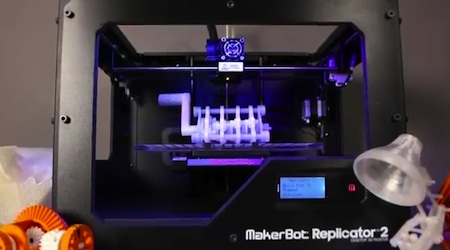MakerBot Updates 3D Printer Line
- By Dian Schaffhauser
- 09/20/12
A company known for its desktop-sized 3D printers has released a new model that provides finer detail, bigger scale, and easier to use software. MakerBot Industries' new MakerBot Replicator 2 desktop 3D printer can accommodate 100-micron layer resolution for more detailed work than previous editions. It also can create objects up to 410 cubic inches in volume (11.2-inches in length, 6 inches in depth, and 6.1 inches in height) and make multiple models at one time. The company's software, MakerWare, has been updated to simplify the process of choosing print settings.
| | 
The MakerBot Replicator 2 features improved layer resolution, the ability to produce larger objects, and easier to use software. | |
The printer is used to create replicas of objects, high-resolution models, functioning prototypes, visual aids, products, and more. Digital designs are translated by MakerWare into instructions for the printer, which then prints out the object layer by layer.
According to MakerBot, the new edition has also been "optimized" for the use of renewable bioplastic PLA filament, the plastic string that's fed into the machine and melted to make objects. The company said this type of filament is especially useful for large format "printing," because it doesn't crack or warp.
"With our fourth generation product, we have made the best desktop 3D printer on the market, made it affordable to both professionals and hobbyists, and made it cool looking," declared CEO Bre Pettis.
MakerBot also said it would be releasing the Replicator 2X Experimental Desktop 3D Printer, intended for experienced users, in January 2013.
The company has also opened a retail location in Manhattan where potential customers can pick up a printer, buy MakerBot-created objects, and watch demonstrations of the printer technology..
The MakerBot Replicator 2 Desktop Printer is $2,199. Currently, the company has a four to six week lag time in supplying printers to buyers. All models are black.
MakerBot printers are in use by teachers and staff at Florida’s Poinciana Elementary STEM Magnet School; Castilleja School in Palo Alto, CA; and National Academy Foundation in Baltimore.
About the Author
Dian Schaffhauser is a former senior contributing editor for 1105 Media's education publications THE Journal, Campus Technology and Spaces4Learning.